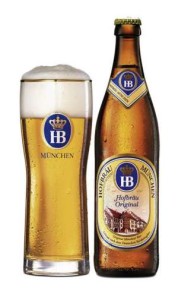 For my latest Vue Weekly column (which is now last week’s but you can still read it here), I tippled a bottle of a beer that I have had only once before, and that was two decades ago during a multi-month backpacking trip through Europe. So you can imagine my delight at finding a bottle of it (and some of its sisters) sitting on an Edmonton liquor store shelf.
For my latest Vue Weekly column (which is now last week’s but you can still read it here), I tippled a bottle of a beer that I have had only once before, and that was two decades ago during a multi-month backpacking trip through Europe. So you can imagine my delight at finding a bottle of it (and some of its sisters) sitting on an Edmonton liquor store shelf.
You see, Munich’s Hofbräuhaus is a local mainstay in that city. It is a must-go-to place where tankards of Hofbräu Munchen beer flow freely.So I went, and I enjoyed. Plus it may have more connection to a country’s history than almost any other beer on the planet. Kings, Dukes, Fuhrers, and Presidents have all sipped on Hofbräu Munchen – which, I am tickled to report, has always been and continues to be state-owned – making it as much a cornerstone of German history as the Reichstag and the protestant reformation. The article discusses some of that history, so I won’t repeat it here.
What I will relay here is the satisfying subtlety of the beer. I fully realize it is not at its peak after thousands of kilometres and many weeks getting here. As a pale, crisp lager, it doesn’t have many resistive powers. Yet, I found all the components of the beer – a grainy, crisp malt with a quiet, earthy hop bite – to have a confident, under-stated quality. Present, but not feeling any need to strut around the room.
That seems to me to be a classic German character. No need to be brash or forward. Let the quiet notes of the beer speak for itself. And despite knowing I would prefer the beer in its Munich Brauhaus (who wouldn’t?), I still really appreciated the balance and overall impression of this beer. We don’t do beer this way in North America, and so I appreciate it all the more.
North America’s hopheads likely will find it boring. But I suspect most beer aficionados will appreciate its quiet, balanced quality. I know I did.


April 28, 2013 at 3:02 PM
Has anyone found Hofbrau Original in Calgary anywhere? Willow Park only seems to have the Dunkel Wiesse.